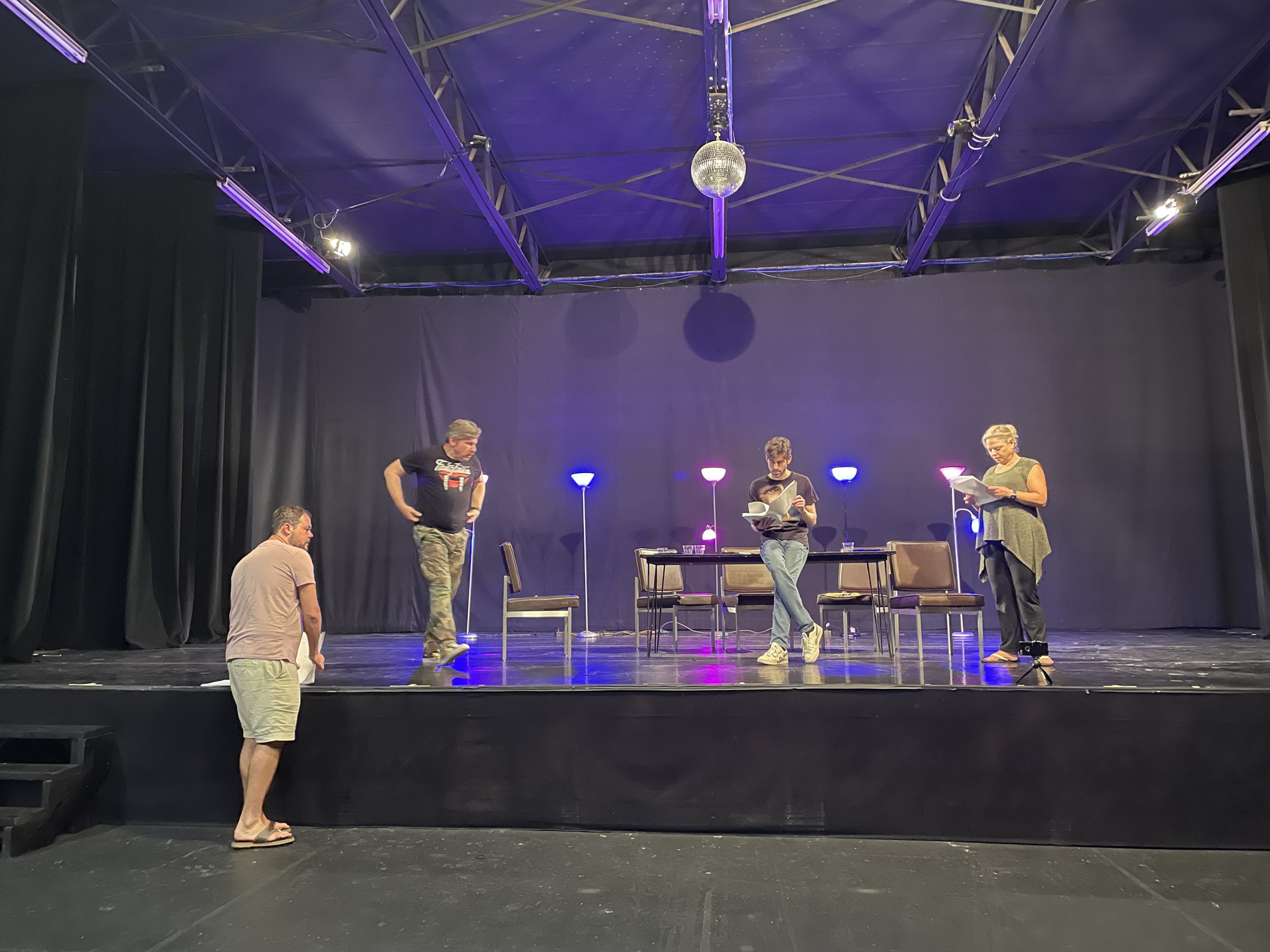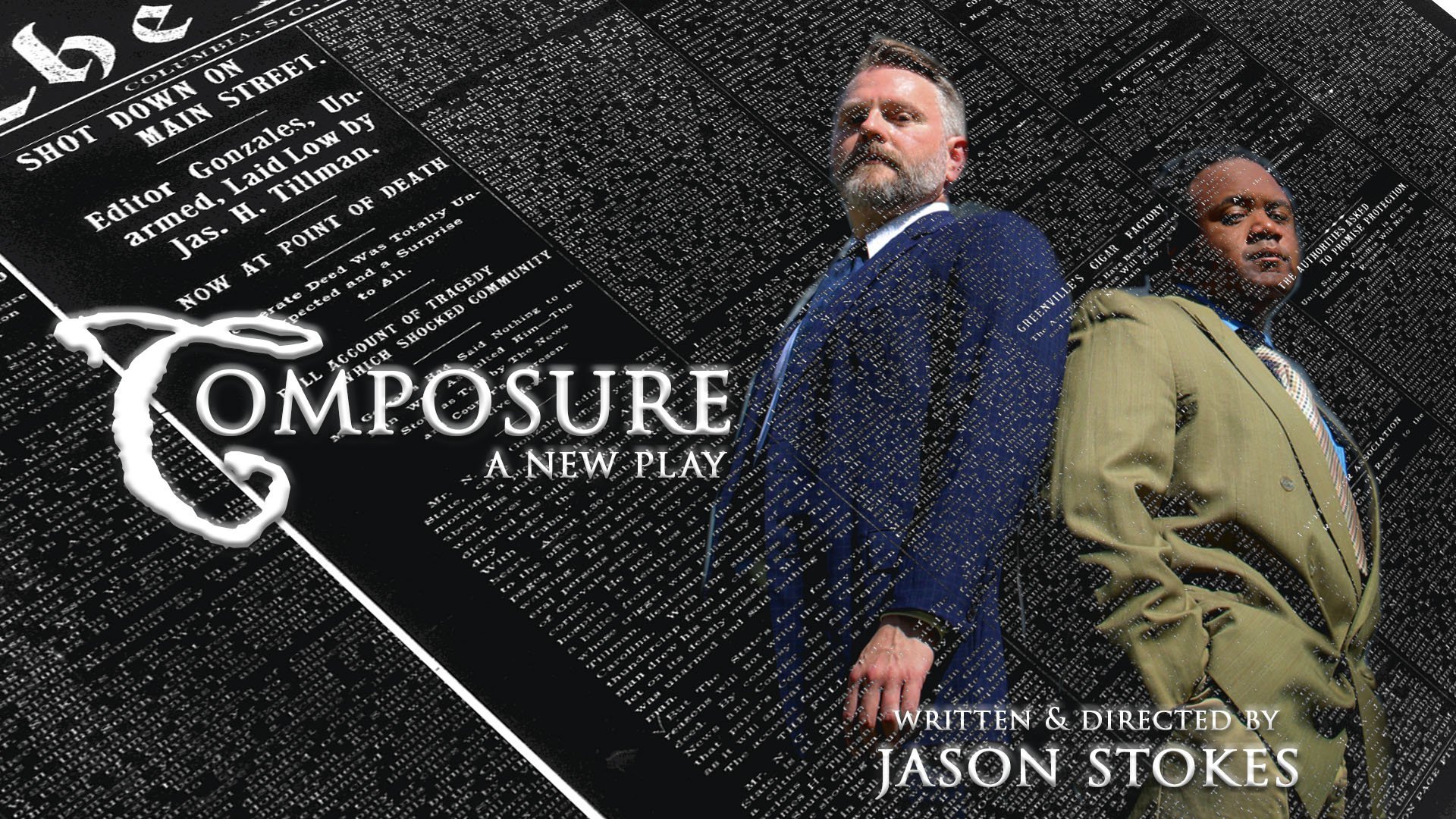If you want to learn about who Moses Andrews III is, we highly recommend listening to his newest album Exodus Pt. II. The personal stories he tells and the range of emotions in the album paint a strong likeness. If you want to hear him expand on the album and the stories, keep on reading.
JASPER: You are one busy dude! What bands (or projects) are you currently working in/on?
ANDREWS: Well, I have quite a list of bands, artists, and projects I’m a part of. To name a few: Autocorrect, GFATS, Miles To Go, Passing Worth, The Runout, The Restoration, The Witness Marks, and a few others. Occasionally, I step in and play with Space Coke, Fat Rat Da Czar, John Callaway (based out of MD), Commandment 11 (Simpsonville), and some others here and there. I’m also a session musician at Jam Room so that gives me so many opportunities to branch out even more.
JASPER: You recently worked on the soundtrack for a Sundance submission—can you tell us more about that?
ANDREWS: The film is an Afro-centric film called Hero and every part of it was shot in Columbia, so this could be something really big for the town. Todd Mathis, a local musician, had given my name along to the Director and the Music Director for the film. I’d found later that Todd would be the engineer and I’d be joining Corey Harris (a Blues and Reggae musician from VA), Kyle “Red” Love (Music Director and Blues harmonica player), and a couple of other musicians from around the country. A lot of the selections were pieces that Corey had written, but we decided to put a new spin on them for the film. We’d also incorporated lots of African sounds into the soundtrack. I’m excited to see how everything fits together.
JASPER: Your newest album Exodus Pt. II came out last month and in the description for it you mention that it is made up of stories that you have held for decades. What do you want people to know about the album?
ANDREWS: The main thing I want people to know about Exodus Pt. II is that it is an effort to be completely honest. People make mistakes. I even talk about my own mistakes on this album. I wanted to add more songs to this album, but it would’ve been too long, so I want to be even more honest with my music in the future.
Black people and other People of Color have navigated this world in so many ways. We’ve had to overcome. As soon as we walk out of our door, we walk into a world where we have to prove that our existence is more than just useful, but valid. We have to prove our feelings are valid. We have to prove that we’re more than just a shooting target. We have to lower ourselves to show that we aren’t a threat. This album, while it talks about being human, it shows that I’m no longer afraid of being Black anymore. I’m no longer afraid of saying that I’m a Black man - not African American, but Black. This album is about empowerment and jumping over hurdles. This album is the start of me standing up for people with bodies like mine.
The content of this album is not influenced by what I believe, but what I embody. The Faith that I come from was not just a belief, but was a fully embodied faith: even in bondage, singing songs of freedom. Even in toil and trouble, singing songs about how we overcome. In a world where I may not have much power to do anything, I still lend my voice in the off-chance that some hearts are changed and are motivated to change others.
JASPER: Was there a song that was really hard for you to write?
ANDREWS: One of the songs from Exodus Pt. II that was the hardest to write was “I Know Everything About Black People.” I had to reopen so many wounds to be able to write this one. This song is just a snapshot of what Black people experience in predominantly white spaces, especially churches that are very Conservative-leaning. About 95% of the lyrics were taken from conversations with white pastors who have made their places of worship into safe havens for racists and bigots. I look at Spotify and see that it’s the top song on this album, but I think it’s because of the name. It catches your eye and draws you in.
Our minds are drawn to things we think are wrong or things we feel like we can correct or make better. Some say that this has come with the age of social media, but I believe it’s always been around, but people just didn’t want to see it. I feel like there are so many people who will not listen to this album because of this song. I also feel that some people know that this song is written about them, or maybe they know who’s the main character.
JASPER: What is your favorite thing you've written and why?
ANDREWS: If I think about everything I’ve written, I think I’ll be spinning my wheels a bit. There are a few songs that stick out to me.
One of my favorite songs I’ve ever written is on my most recent album, and it has to be IOU. The feelings that I’d felt while writing it are still there. You can feel the pain of someone being asked to completely change who they are to please others in the workplace. I feel like a lot of people, especially Millennials, can identify with some of these feelings of just being there, making little money, not getting ahead, etc. While a lot of songs were honest, this one was like talking to my therapist.
JASPER: If you were to associate a condiment with each of your albums what would they be and why?
ANDREWS: Well, If we’re talking about my personal music, this is an easy one. Exodus Pt. I would be more like ketchup because when you’re growing up, your taste buds haven’t developed enough to appreciate more than ketchup. This album is easy listening compared to the next one.
Exodus Pt. II is like a hot sauce that I make called Sri-HOT-cha: you can feel the heat at the beginning, but then you get some garlic and fruitiness coming through until you reach the slow burn, ramping up and taking you on a roller coaster. Exodus Pt. II was like that for me, especially in the way it was laid out. Hot sauce is my favorite condiment and Exodus is my favorite album that I’ve ever recorded.
JASPER: How has becoming a father impacted you and your music?
ANDREWS: Being a father has changed a lot for me! I used to have instruments set up everywhere in the house, but they’ve since become his play areas. Almost every one of my instruments is packed up and in the closet because there’s nowhere to put anything. This has also affected my practice time because I want to give Miles more attention. Family time is important. After he goes to bed, it gives me a chance to actually visualize what I need or want to play since I can’t just plug in and play out loud. It is very interesting to see how he reacts to different styles of music. I can’t wait to see what Miles does in the future.
JASPER: What is the biggest assumption people tend to make about you and your music?
ANDREWS: What a question! People assume a lot about me simply by the way I look. Being a big Black man in the South, I get a lot of interesting questions and looks. I’m a big guy so people look at me like I’m a Grizzly bear instead of a Teddy bear. I was releasing an album with Autocorrect one evening and someone asked me if I was playing and if I make the beats. I used to make beats when I was a teen and there’s nothing wrong with making beats, but you can’t just assume that since I’m a Black person that I just make beats and not play an actual instrument. When I was at Carolina, I’d be carrying an instrument in a case and they’d still ask if I was a DJ. Those are small examples.
There are many other ways people have made assumptions about me and my music, but it has also happened in the white church. Being in predominantly white spaces, people learn one thing about you and they assign that one thing to you. You change yourself to help people feel more comfortable so that you don’t risk being “too Black” or look like a threat. Over time, you strip yourself away and become this completely different person playing Contemporary Christian Music only to have people approach you and talk about Gospel music and how much they love Andrae Crouch. I’d spent so much time away from Gospel music that I’d forgotten what it felt like to play it and be challenged by it. They assumed I was still in Black American Christian culture when I was so far removed from it.
JASPER: What are some things you like or dislike about the Columbia music scene?
ANDREWS: Some of the things I love about the music scene in Columbia is that there are always new artists coming out with music. Just watching people like Lola Grace is so cool. Another thing I like is that we have places like New Brookland Tavern and Foxfield that welcome musicians no matter how many people they draw. This is where they can grow and become somebody.
One of the things I dislike about this Columbia music scene is that there is still so much division. There are still cliques and people only know each other passively. I wish I could see more people working together. I think it’s so common these days to see the Person of Color being the one building the bridge or going the distance to create harmony. We always have to be the person to make the move and invade these spaces to add more color. I can name a handful of people of color in a lot of these spaces. I can guarantee you that when they are in these spaces, they feel like they’re the only one at that particular time.
JASPER: What wisdom do you wish to impart on musicians just starting out?
ANDREWS:
Make friends with everyone. Break down the barriers.
Stop booking the same kinds of shows all the time.
If other artists or bands are coming out to your shows/gigs and buying your music or “merch,” make sure you are returning the favor. So many people can’t get anywhere because we aren’t supporting our own musicians in our own towns.
Learn how to play more music. If you learn more styles of music and get good, you may get called into the studio to do session work.
Change your attitude. Be humble. There are musicians that I know who think they’re amazing, but they can’t play more than four chords. All they bring is an image, a vibe. The time has come to learn and grow. Take time to work on things and come with something new.
Make space in the community for people who don’t look like you, and not just the tokens or the ones who make you comfortable.
You can see Andrews perform Thursday, August 18 at 8pm at Uncle Festers with St. Jupiter, Deft Key & MC Beetnik and listen to his newest album on his bandcamp.







































